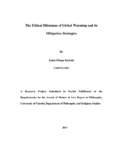| dc.description.abstract | This research titled, “The Ethical Dilemmas of Global Warming and its
Mitigation Strategies”, focuses on the ethical issues arising from global warming and
especially the implications of mitigation and adaptation on the least advantaged globally.
Global warming is primarily attributable to the increased burning of fossil fuels in both
developed and developing nations and is considerably destroying the Earth‟s climate.
This research observes that harmful climatic effects resulting from this phenomenon are
today experienced mostly by the least developed countries. Those who have contributed
least to global warming and greenhouse gas emissions are suffering the worst climatic
effects.
This research uses Garrett Hardin‟s famous thesis The Tragedy of the Commons
as its theoretical framework. Hardin observed that people tend to over-exploit a
commonly owned resource resulting in its eventual ruin. In this study, earth‟s climate is
“the commons” under threat of destruction by global warming. Based on Hardin‟s thesis,
this study begins by exploring the ethical implications of harmful climatic effects arising
from the burning of fossil fuels and the inadequate capacity of poor countries in
arresting these effects. This study examines climate-science and its epistemic status in
light of the ethical issues claimed to follow from global warming. This is followed by an
examination of mitigation strategies developed over time and the ethical dilemmas of the
responsibility we have today of industrializing while averting harmful climatic effects
on the poor and potential harm to future generations.
The research then examines the Kyoto Protocol, the most notable international
agreement crafted to address global warming and its effects. This Protocol proposed
reductions in greenhouse emissions and mitigation mechanisms by nation-states to save
the world from further heating and catastrophic climatic effects. The research observes
that the implementation of this protocol has been, and is still, controversial as it is not
binding on all nations and is therefore insufficient in abating global warming.
With regard to mitigation mechanisms proposed under this Protocol, this research
observes that the least advantaged countries have inadequate capacities of implementing
these measures at the expense of their economic progress while many developed nations
are reluctant to intensify mitigation efforts despite having the means. This situation
represents the stretching of commonly owned resources by a growing and industrializing
population similar to the addition of extra herds in a limited pasture espoused by Hardin.
The research concludes by recommending joint efforts by all nations in mitigating global
warming through carbon-capture techniques and the use and development of renewable
energy sources in addition to formulation of a much stronger binding framework
committing state-parties to lower their emissions for the sake of present and future
generations. These efforts will go a long way in saving and protecting our global
commons-the climate. | en_US |

